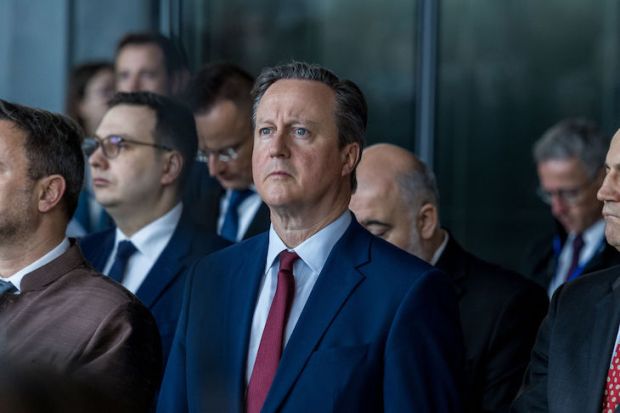Environmentalism is the ruling ideology of our times. Forget neoliberalism. That peaked around 2000 and was definitively dethroned by the financial crisis in 2008, the same year Parliament passed the Climate Change Act which paved the way for Net Zero. Since then, environmentalism has won victory after victory, so it might appear paradoxical that one of the founders of the British green movement struck a defeatist note. Speaking at an event to celebrate the Green Party’s 50th anniversary, Michael Benfield suggested that the ‘battle for the world’s environmental survival is, at this moment, lost.’ The Greens had succeeded in raising consciousness, Benfield said, ‘but we have failed in dealing with the battle for environmental survival.’
Any ideology claiming to represent the sole path to salvation from an otherwise inevitable apocalypse – in this case a planetary one – is bound to have a sobering confrontation with reality. As Benfield admits, the scale of the solutions he believes necessary are too unpalatable for any political party.
Environmentalism harbours an internal contradiction
In terms of economics, environmentalism is a more radical ideology than classical Marxism. Whereas Marxism was about changing the ownership of the means of production, environmentalism aims to change the means of production themselves. Greens want to reverse the Industrial Revolution, which they see as the original sin of modern civilisation for unleashing global, self-sustaining economic growth they claim is destroying the planet. Growth, though, is something people want. At a minimum, maintaining people’s living standards is something every political party other than the Greens, with their one MP, must promise voters, even if their policies won’t or can’t deliver it.
Though triumphant, environmentalism harbours an internal contradiction. Its favoured energy policy of replacing nuclear and fossil fuels that power modern society with wind and solar requires the industrialisation of nature, with energy production taking a vastly expanded environmental footprint.
Earlier this week, Greta Thunberg was detained by Norwegian police in a protest demanding the removal of 151 wind turbines from reindeer pastures used by Sami herders in central Norway. Such clashes are likely to become more frequent. Compared to nuclear and fossil fuel energy, wind and solar are low density energy sources. This necessitates a massive land take, impacting the integrity of local habitats, the destruction of birds of prey by the blades of wind turbines and the mass killing of bats from the pressure waves of wind turbines, all in the name of saving the planet. The local is sacrificed for the global.
This contradiction was the subject of Michael Moore’s 2020 movie Planet of the Humans. The film sparked outrage for showing how environmentalism morphed into a tool of green corporate power. Josh Fox, maker of the tendentious anti-fracking movie Gasland, denounced Moore for touting ‘blatantly untrue fossil fuel industry talking points,’ even though they were being made by left-leaning academics. Fox organised a petition demanding an apology and retraction of Moore’s film. YouTube complied and took down Planet of the Humans, purportedly on the grounds of copyright infringement for using a few seconds of footage of rare earth minerals being transported from Inner Mongolia. Attacked by climate scientist Michael Mann for containing ‘distortions, half-truths and lies’ and for serving as ‘a wedge to divide the environmental community,’ the ban was subsequently lifted.
Economic growth is the biggest wedge dividing committed greens from their more pragmatic fellow travellers and the vested interests supporting and often financing them. In his recent Net Zero Review, Tory MP Chris Skidmore calls net zero ‘the growth opportunity of the 21st century.’ Instead of analysing the costs of net zero, the Skidmore report is little more than a wish-list drawn up by rent-seeking renewable energy interests (‘the prize on offer to UK industry’).
True believers, on the other hand, don’t want growth of any kind. De-growth is what they seek. One of the foremost advocates of renewable energy is Amory Lovins, who in 1982 founded the Rocky Mountain Institute as a renewable energy think tank.
‘It’d be little short of disastrous for us to discover a source of clean, cheap, abundant energy because of what we would do with it,’ Lovins said in an 1977 interview. ‘We ought to be looking for energy sources that are adequate for our needs.’ Adequacy, not abundancy, is the true green goal. For committed greens, the virtue of renewable energy is that it is neither cheap nor abundant, because replacing fossil fuels with renewables helps push economic growth into reverse.
The net zero target was adopted on the basis of the Committee on Climate Change’s fairy tale of ever cheaper renewable costs. The realisation is now dawning that, like everything else, renewables need cheap fossil fuels. With news that Ørsted, the Danish wind energy company, could shelve the Hornsey Three offshore wind project unless the government provides more subsidy, it is becoming clearer each day that this particular fairy tale is shaping up to be one with a dark, unhappy ending.
Rupert Darwall is a senior fellow of the RealClear Foundation and author of Green Tyranny
Got something to add? Join the discussion and comment below.
Get 10 issues for just $10
Subscribe to The Spectator Australia today for the next 10 magazine issues, plus full online access, for just $10.




















Comments
Don't miss out
Join the conversation with other Spectator Australia readers. Subscribe to leave a comment.
SUBSCRIBEAlready a subscriber? Log in